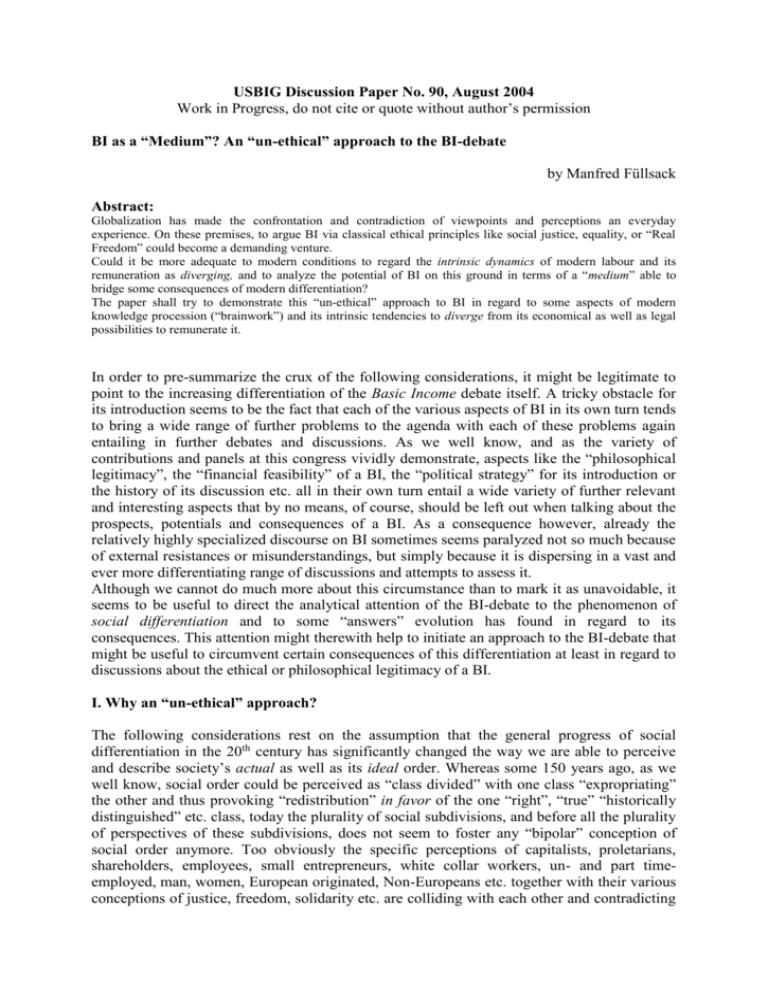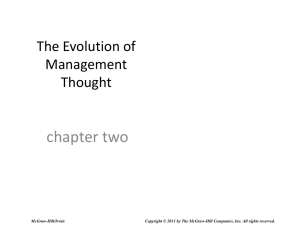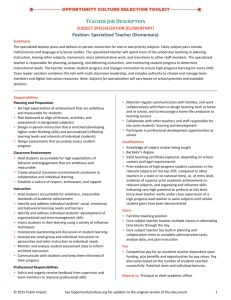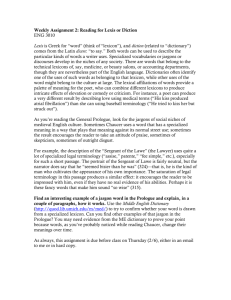BI as a “Medium”? An “un-ethical” approach to the BI
advertisement

USBIG Discussion Paper No. 90, August 2004 Work in Progress, do not cite or quote without author’s permission BI as a “Medium”? An “un-ethical” approach to the BI-debate by Manfred Füllsack Abstract: Globalization has made the confrontation and contradiction of viewpoints and perceptions an everyday experience. On these premises, to argue BI via classical ethical principles like social justice, equality, or “Real Freedom” could become a demanding venture. Could it be more adequate to modern conditions to regard the intrinsic dynamics of modern labour and its remuneration as diverging, and to analyze the potential of BI on this ground in terms of a “medium” able to bridge some consequences of modern differentiation? The paper shall try to demonstrate this “un-ethical” approach to BI in regard to some aspects of modern knowledge procession (“brainwork”) and its intrinsic tendencies to diverge from its economical as well as legal possibilities to remunerate it. In order to pre-summarize the crux of the following considerations, it might be legitimate to point to the increasing differentiation of the Basic Income debate itself. A tricky obstacle for its introduction seems to be the fact that each of the various aspects of BI in its own turn tends to bring a wide range of further problems to the agenda with each of these problems again entailing in further debates and discussions. As we well know, and as the variety of contributions and panels at this congress vividly demonstrate, aspects like the “philosophical legitimacy”, the “financial feasibility” of a BI, the “political strategy” for its introduction or the history of its discussion etc. all in their own turn entail a wide variety of further relevant and interesting aspects that by no means, of course, should be left out when talking about the prospects, potentials and consequences of a BI. As a consequence however, already the relatively highly specialized discourse on BI sometimes seems paralyzed not so much because of external resistances or misunderstandings, but simply because it is dispersing in a vast and ever more differentiating range of discussions and attempts to assess it. Although we cannot do much more about this circumstance than to mark it as unavoidable, it seems to be useful to direct the analytical attention of the BI-debate to the phenomenon of social differentiation and to some “answers” evolution has found in regard to its consequences. This attention might therewith help to initiate an approach to the BI-debate that might be useful to circumvent certain consequences of this differentiation at least in regard to discussions about the ethical or philosophical legitimacy of a BI. I. Why an “un-ethical” approach? The following considerations rest on the assumption that the general progress of social differentiation in the 20th century has significantly changed the way we are able to perceive and describe society’s actual as well as its ideal order. Whereas some 150 years ago, as we well know, social order could be perceived as “class divided” with one class “expropriating” the other and thus provoking “redistribution” in favor of the one “right”, “true” “historically distinguished” etc. class, today the plurality of social subdivisions, and before all the plurality of perspectives of these subdivisions, does not seem to foster any “bipolar” conception of social order anymore. Too obviously the specific perceptions of capitalists, proletarians, shareholders, employees, small entrepreneurs, white collar workers, un- and part timeemployed, man, women, European originated, Non-Europeans etc. together with their various conceptions of justice, freedom, solidarity etc. are colliding with each other and contradicting each other in manifold ways. To argue social conceptions like BI on classical “monocontextural” ethical notions can be an endeavor that in itself entails more efforts to consider all arguments than it is able to provide an operable base for discussing further aspects of BI. But even if one is willing to take this challenge, the “ethical” approach carries yet another difficulty. Especially with highly “emotionalized” conceptions like BI the risk seems high that the endeavor to legitimize them engages the legitimizer illegitimately into what he is trying to legitimize. In other words, the attempt to assess the prospects of conceptions like BI in regard to ethical notions such as social justice or Real Freedom can run aground the well known problem that the assessor’s objectivity gets lost in his engagement for what he considers social just. Of course, as we know, this problem is not to be solved. An assessor of social order is always part of what he assesses and thus “emotionally” involved. The only way to somehow lessen this problem seems to choose an assessment unit as “neutral” as possible in regard to the subject in question. In this respect, and given the postmodern plurality of aspects, I consider classical “ethical” conceptions not the first choice. As a consequence, the paper in hand suggests to assess BI no longer primarily in regard to its potential to guarantee a “higher” form of social justice or Real Freedom, but to investigate its potential as a “medium” in regard to consequences of social differentiation. What is to be understood under the term “medium” in this regard will be demonstrated via specific particularities of “brainwork”, or in other words, of knowledge procession.1 Underlying, however, rests the assumption that essential dynamics and aspects of brainwork are characteristic for other forms of work as well. II. What is a “medium”? A “medium”, according to social theoretic conceptions of Parsons or Luhmann is an evolutionarily emerging structure that raises the probability of social interactions that due to social differentiation are at risk to fail. A “medium” in other words, might help to “bridge” gaps that arise between diverging social dynamics due to social differentiation. Or more correctly, a “medium” might raise the probability of “bridging” such gaps. The classical example for the “media-conception” of Parsons has been money and its ability to enable the continuation of goods and services exchange in society even though advancing social differentiation constantly diminishes the probability for its success. Money in this regard “mediates” the exchange of goods and services. It seems easy to imagine that under simple social conditions, i.e. for example in societies with not more than a couple of dozens members where everybody knows everybody, the creditworthiness of each member can be common knowledge and thus will not hinder the exchange of goods and services even though exchanges are not always “paid back” at once or in time. Under more complex social conditions, however, i.e. for example in societies with several thousand members when not all members are acquainted with each other and thus not everybody’s creditworthiness is known, the success of goods and service exchange can be severely endangered. In order to “bridge” this consequence of social differentiation, i.e. in this case the simple growth of population, money takes over the function of guaranteeing (“mediating”) the creditworthiness of society’s members. The bearer of money will get goods or services regardless whether the goods and service provider knows him or remembers his creditworthiness. The paper in hand is a (very) compressed form of some parts of a much broader investigation into the “value of knowledge in modern societies” currently being prepared for publication. 1 2 In the paper at hand, however, the term “media” is used in a derived and much more general way. I will regard “media” as means capable to raise the probability of correlations between the supply of specialized work and its demand. The assumptions that I will try to demonstrate in regard to “brainwork” are: a. work is constantly and incessantly specializing due to its own intrinsic dynamics b. specialized work is work that by definition is not commonly demanded. It is not demanded at all times and in all parts of society. Specialized work thus runs up against difficulties to “encounter” its demand and therewith to acquire means (remuneration, incomes) for its continuation. c. in order to correlate supply and demand of specialized work and therewith to enable the continuation of specialized work society (or evolution) has generated a variety of “media” d. due to their own intrinsic logic however, these “media” always and necessarily carry enabling as well as restraining factors in regard to their function as “media”. While mediating supply and demand of specialized work in some regards, they tend to enforce the diversion of specialized work supply and specialized work demand in others, thus raising the probability of a correlation of specialized work supply and specialized work demand while synchronously diminishing it. e. Furthermore, many of these “media” function by creating and isolating special markets for specialized work, thus partly detaching specialized work from the overall market, or in other words, from overall economic proceedings. In this regard, directing analytical attention at such “media” shows that a partial detachment of work and the terms of its remuneration as it would be incited by a BI is nothing essentially new in history In this respect, I will conclude my demonstration with some considerations about f. why and if a BI could be assessed more fruitfully as a “media” than in terms of any “ethical” conception. As said above, the following considerations will assess these assumptions in regard to some aspects of knowledge production, i.e. brainwork. There is, however, reason to assume that all or most of the mentioned phenomena, dynamics and consequences can be observed in regard to the general work process as well.2 III. The “immanent logic of specialized knowledge production” Why is work, and in particular brainwork constantly and incessantly specializing? Apart from producing and processing knowledge, brainwork seems to carry a second side, one might say, a “dark side” which is responsible for the fact that the more we know, the more we usually also know how much we do not yet know. In other words, knowledge production steadily produces knowledge of things, spheres and phenomena about which it would be good to know more. We can say, knowledge production, i.e. brainwork in its own right constantly and inevitably generates ignorance. On a general level this can be explained with the fact that every particle of newly generated knowledge defines a new state of knowledge, a new knowledge level one might say, from which the world appears under new aspects. Knowing how to construct gasoline engines for instance brings up the possibility to put them on wheels and therewith to mobilize society. As a consequence of this knowledge, however, a whole lot of ignorance arises about how to 2 cf. to this more detailed: Füllsack M. 2002, Leben ohne zu arbeiten? Zur Sozialtheorie des Grundeinkommens. Berlin (Avinus) 3 guarantee steady petrol supply, how to provide parking spots in big cities, or how to keep pollution in acceptable limits. Knowing about how to operate computers brings up the possibility to connect them to each other and in consequence creates ignorance about how to cope with internet viruses, spam mails, hoaxes etc. In other words, assessing the world by means of new knowledge creates new problems as well – problems that were not to be seen before this knowledge had been available. Unfortunately, this is (as can be shown more consistently in terms of Systems Theory3) an inevitable feature of knowledge production. We therefore will call it the “immanent logic of knowledge production” and conclude that this logic inevitably and incessantly drives knowledge production into differentiation and specialization. Each ignorance (each problem) that arises anew in consequence of the creation of new knowledge demands new and thus more specialized knowledge in its own turn. As most brainworkers know, knowledge thus rapidly tends to differentiate and specialize up to a degree on which this differentiation and specialization itself becomes problematic in manifold ways and starts to demand solutions in its own turn – solutions for which, in order to find them, again knowledge producers have to specialize – knowledge producers, so to speak, that now are specialized on the problems of specialized knowledge production. Specialized knowledge is, as the term suggests, knowledge that distinguishes from common knowledge by the very fact that it is not utilized all the time but only in special situations, and it is also not utilized by all of society but only by a small specialized part of it. Hence, specialized knowledge can be distinguished from common knowledge by its relation to market demand. While common knowledge might be demanded commonly, specialized knowledge is knowledge demanded only on specialized markets. While one might suggest that common market demand and common knowledge production develop somehow in correlation to each other – by definition it wouldn’t be common knowledge if it wouldn’t be demanded commonly –, this is not necessarily the case with specialized market demand and specialized knowledge production. The dynamics of the one as well as the dynamics of the other are no longer determined by common impulses but each in its own turn by very special ones. Subsequently, demand and supply of specialized knowledge production tend to substantially diverge, or in other words, the probability of a correlation of supply and demand of specialized knowledge and thus the chance to acquire sufficient means to continue brainwork decreases with the increase of differentiation and specialization of knowledge. In respect to this problem, society has “convened” on4 a variety of “media”. Although originally meant to bridge the rising gap between supply and demand of specialized knowledge production these “media” factually, as we shall see, tend to widen it even further. In order to illustrate this, we shall regard two famous examples for such “media”. They are: 1.) Intellectual Property Rights, and 2.) scientific institutions. IV. Media example 1. Intellectual Property Rights The first Intellectual Property Rights were, as far as we know, introduced in regard to rather particular economic interests in the 15th and 16th century, when sovereigns in England and Italy considered it beneficial to concede privileges for the commercialization of inventions to 3 cf. for this among others: Füllsack M. 2003, Auf- und Abklärung. Grundlegung einer Ökonomie gesellschaftlicher Problemlösungskapazitäten. Aachen (Shaker) 4 more exactly: evolution has created … 4 certain interest groups. The first “copyright” for example has not been granted as a property right to authors in general, but in reaction to the invention of the printing press in 1476 to the London Stationers Company, the guild of British letterpress printers, in the form of a privilege to exclusively sale its products and to find and destroy illegal copies. The first known patent for an industrial innovation seems to have been the privilege of a certain Filippo Brunelleschi in 1421 to exploit his invention of a crane on a boat to transport marble blocks for three years exclusively. In both cases the introduction of these privileges has been a reaction to particular economic interests and not to the general problem of the differentiation of supply and demand of knowledge production. In both cases, however, the underlying problem has been the wellknown fact that knowledge products to some extent can be copied without being consumed, or in other words, that knowledge can be commercialized by those who don’t have it and can be sold by those who don’t owe it, and the production of knowledge and the commercialization of knowledge thus are able to differentiate. As a consequence, the risk was rising that others than knowledge producers will profit from their products and knowledge production itself, due to a lack of means, might come to a halt. At first, this problem was tackled by conceding monopolies to certain individuals or lobbies in order to give them exclusive chances to satisfy occurring demands without competition. However, these concessions soon proved to have negative effects on the progress of knowledge production itself. Individually granted copyrights or patents could do no other than to include some and exclude others from the use and from the sale of knowledge, thus restricting access also to potential innovators. As a consequence, in the year 1624 the British parliament undertook it to abolish most individually granted monopolies in the famous “Statute of Monopolies” by generalizing them in special “Letters of Patent” for all “first and actual inventors” of intellectual products for up to 14 years. Eventually, as we know, intellectual products were attributed as formal property to its authors in the French patent law of 1791 and finally in most industrialized nations after the economic crisis of 1873 when free trade ideology lost ground against more regulative economical conceptions. The producers of specialized knowledge therewith seemed to have gained an effective mean to keep their production at least somehow in touch with the dynamics on specialized markets. At least they should be able to answer arising demands on these markets exclusively on their own now. With the institution of Intellectual Property Rights they should be able to promote, with whatever kind of revenues the commercialization of their products might bring, “the progress of science and useful arts“, as the US-constitution in this regard states. However, as we know, Intellectual Property Rights are plagued with a wide variety of problems. At first, the very fact that they are highly specialized knowledge products themselves entails further specialization in order to be able to process, control and maintain them. And here again, the more special and particular Intellectual Property Rights have to become in reaction to the steady influx of new forms of knowledge, new forms of copying, archiving and commercializing possibilities and new markets for knowledge, copying, archiving and commercialization etc., the more the degree of overall specialization rises, and the more the supply and the demand of specialized knowledge diverges. The consequences are well known: highly bureaucratic organizations that hopelessly lag behind actual developments and high administration costs often of no relation to what can be gained by Intellectual Property Rights. In other words, what was meant to “bridge” the rising gap between supply and demand tends to deepen it further. Intellectual Property Rights seem to loose their potential to provide sufficient means for the continuation of specialized knowledge production. In the realm of 5 science, for instance, measurable stimulating effects on research they shall have only in some disciplines like pharmacy or chemistry (cf. Gröndahl 2002: 95) – and this in spite of concerted efforts for example by the US-government to install them as prime incentives by setting up patent-departments in several big universities in the country starting in the 1970ies. Furthermore, Intellectual Property Rights, even if generalized for all producers of knowledge, are still monopolies thus including some and excluding others from the use of knowledge. Essential innovations or inventions might not be made, or more generally formulated; essential problems might not be solved just because those who would have the potential to do so do not have access to the appropriate knowledge. Examples are manifold and well described in literature.5 And eventually, even if Intellectual Property Rights somehow actually provide certain possibilities to correlate supply and demand of specialized knowledge production, they do not help to solve the problem that demand has to exist before it can be reserved to brainworkers. What if it doesn’t exist? Or if it doesn’t exist at the time when knowledge producers need it to acquire incomes in order to continue their work? Or what if it doesn’t exist in their life times at all? Examples for the latter can be found in abundance in history. But lets still look shortly at one well-known case in order to distinguish some aspects of this problem. In the first half of the 19th century the immanent logic of mathematical knowledge production has (as we simplifying assume) brought up problems of a kind that have challenged a knowledge producer by the name of George Boole to detach mathematical formalisms from the interpretation of their content and by this develop an abstract algebra that even the highly specialized market for mathematics did not have too much demand for at the time. In terms of contemporary knowledge production Boole’s Algebra could have been considered a classical example for non-applicable science. More than hundred years later, however, this algebra suddenly and completely unforeseeable encountered the demand of a completely different specialized market for knowledge products – the computer and IT-technology. As the example shows, the immanent logics of specialized knowledge production and the immanent logics of specialized markets are not always and necessarily once and for all, so to speak, “pointing in opposite directions”. It can never be excluded that supply and demand might once meet again – even with the most “airborne” knowledge products. The problem, however, is the probability of this meeting. If probability is too low, brainworkers will run into problems to gain sufficient means to continue their work and the production of specialized knowledge will come to a halt. In regard to this problem, society (or rather: evolution) has, as we said, inserted “media” in between the diverging dynamics of supply and demand. At least at times recognizing the necessity to secure the continuation of specialized brainwork (although as a rule due to In the case of so called “accumulative technologies” for instance - cars, airplanes, computers etc. – innovations are often essentially built on former innovations which can’t be realized if one of them is blocked by a patent. (cf.: Merges/Nelson 1990: 884-898) Subsequently, enterprises tend to strategically obtain patent-portfolios, not for securing revenues, but for “cross licensing” their patents in exchange for needed patents. Or they try to surround their products by “patent-thickets”, dense webs “of overlapping intellectual property rights that a company must hack its way through in order to actually commercialize new technology“ (Shapiro 2001: 1-2) Also currently discussed are phenomena like the patenting of traditional food (e.g. Basmati-rice) or medicine sources of indigenous people, or the project by Graig Venter for decoding the human genome and trying to patent it for commercial exploitation. 5 6 particular interests and not to moral considerations or “enlighted” farsightedness6), society has, as we (a bit misleadingly7) might say, “convened” on a couple of institutions in the hope to bridge the steadily rising gap between supply and demand of specialized knowledge. In the case of George Boole society has “convened” on inserting scientific institutions, above all a Royal Academy, between the diverging forces of supply and demand of specialized knowledge. V. Media example 2. Scientific institutions8 Abstractly the institutionalization of highly specialized brainwork might be described as the institutionalization of the exemption of brainworkers from the necessity to care for common problems. Only by sparing brainworkers common problems they get a chance to deal with specialized problems. In ancient societies for example, priests and similar folk have been exempted from profane every day necessities by certain “contributions” of other society members, often in the form of natural produce, in order to enable this folk to specialize, let’s say, on ideal or spiritual problems. As one precondition9 for such exemptions, however, society had to be sufficiently affluent. Its productivity had to be high enough so that it could afford the exemption of some of its members from profane work and thus “free” them for specialization. Aristotle clear-sightedly described the first mathematicians of Egypt as a consequence of the economic prosperity of the land on the Nile. And the English term “school” derives, as we know, from the Greek word schole for “taking a break from work” and the Latin word schola for “idleness” which was used to label activities medieval monks were doing after work, i.e. when they were trying to solve spiritual problems because their practical duties were done. The introduction of schools had, as we know, far reaching consequences for the specialization of knowledge production. On the one hand, schools provided certain exemptions from the necessity to care for more profane problems by “correlating” the specialized knowledge of teachers with the specialized demand of pupils thus providing some sources of income to specialized knowledge producers. One might regard schools and universities etc. in this respect as “islands” of high probability for correlations of supply and demand of specialized knowledge. On the other hand, however, schools and then even more universities also significantly contributed to enhance specialization. School knowledge had to be organized, systematized and condensed in order to distribute it in tuition. It called forth a vast variety of new special activities like didactics, pedagogy, rhetoric, methodology, theory etc. In addition, concentrating the tasks of knowledge distribution in schools freed knowledge production in its turn from the necessity to be distributable. When in Germany for example the plurality of early-modern educational institutions became unified in a system of secondary 6 As several sources illustrate, already in middle ages the introduction of schools, universities, academies etc. seems to have been rather a consequence of special interests – for example of those of religious orders to keep their dogma and its distribution pure – than an immanent necessity of knowledge production itself. 7 To speak of “conventions” in regard to society’s distribution orders is of course a severe abbreviation. See to this also footnote 9. 8 The following is a very compressed version of respective investigation that in its shortness clearly emphasizes certain aspects over others in order to deliver the argument. 9 Another precondition in this regard is the existence of a sufficiently stabile “consensus” among society members about how their social product shall be distributed. The far-reaching consequences of this precondition can not be discussed in this paper. Here, all we can do is to hint at the fact that such “consensuses”, are knowledge products themselves and thus subject to the same “immanent logic of knowledge production” as emphasized here. 7 education, the teachers of the tertiary educational system, i.e. the university teachers who so far were bound to certain degrees of applicability in their teachings were freed from the necessity to teach basics first. Specializing on “unteachable” issues, their activities could significantly proceed in the direction of “pure science”. “Pure science”, or “science for science’s sake”, which, as we know, at first often found its material background in the inherited (“ascribed”) social positions of its proponents soon started to call forth the institution of “media” in its own right when the traditional base for the exemption of its proponents from profane needs began to vanish in the course of social modernization. As a consequence, memberships in scientific societies and Academies, or employment in universities and other scientific institutions started to take over the function of “shielding” science from general market demand. When, as a consequence, scientific professions gained reputation and influence that made it necessary to shelter them from political or economic fluctuations by the way of tenures, standardized wages and other social securities knowledge seemed to reach a degree of exemption that made it nearly impregnable to forces and dynamics on the free market. Detached in this way from overall social demand, sciences found much space to “freely” follow its “immanent logic” and differentiate into a wide plurality of disciplines and fields. A plurality, however, that continues to constantly contribute more and more specialized knowledge to the already existing stock of knowledge and thus ignites competition between different knowledges, between different truths – a competition which in its own turn of course again enhances specialization. As one consequence, the half-life of knowledge dramatically started to decrease. If about hundred years ago specialized knowledge that was acquired in the course of school education seemed good enough to provide job opportunities for a life time, today job providing knowledge seems to vary within months. Just to invest, let’s say, three months into mastering a state of the art computer program can by no means guarantee that this program will still be state of the art after these three months. The rapidly decreasing half life of specialized knowledge thus renders teaching syllabi, educational programs and career plans to the imponderability of chance. University trainings today change their objectives three or four times while still in progress. And sometimes no training at all seems to be valued already higher than any specialization. A cynical advertising jingle on Austrian radio recently answered the shy admission of a job aspirant not to dispose of any qualifications with the pleased outcry of the personnel manager, “Perfect, then we don’t have to retrain you”. What is more, the rapidly decreasing half life of specialized knowledge self-referentially turns back at the conditions of specialized knowledge production itself. The permanent and ever more rapidly proceeding replacement of knowledge by other knowledge, the “succession of paradigms and epistemes”, so to speak, renders attempts to estimate and value knowledge more and more problematic. As one consequence, momentous “warps”10 in general knowledge production in regard to its institutionalized form seem to emerge. Since definition power on what is relevant knowledge as a rule is bound to influential positions in scientific institutions which today due to tenures and many other factors can dispose of considerable more stability in time than the knowledge that was necessary to obtain them, the power to decide what is relevant knowledge can significantly diverge from actually knowing. Universities nevertheless are forced to rely on these positions for example in order to select their faculty and thus to decide what knowledge will be processed and taught. And scientific The German term is „Verwerfungen“ and has central significance in the conception described in Füllsack 2002 and 2003 (cited above). 10 8 funds are forced to rely on them in order to decide which projects to finance and therewith which brainwork to exempt from profane needs in order to enable it. Needless to say, that the more these positions are relied on – for example in political assignments and consultations – the more they tend to gain reputation and influence and thus stability. The more they stabilize, however, the more the rapidly shortening half-life of knowledge tends to detach them from the actual forefront of knowledge production. Spending time on consulting decreases, as we know, the time for research. In short, today, the power to define what is relevant knowledge does not necessarily correlate with the command of relevant, or let’s say, of most advanced knowledge anymore. Knowledge, due to its differentiation, more and more seems to gain relevance in regard to factors external to itself. In terms of its value it becomes accidental, if not arbitrary. If not knowledge itself, but external coincidences like the right position in the right scientific institution at the right time define what is knowledge then, one might say, knowledge becomes a pray of pure chance. Whoever claims loudest and most convincible to know seems to command knowledge. C’est la condition post-moderne. This condition concerns the debates on how specialized knowledge production should be remunerated. It concerns the “consensus” a society finds on its rules how to distribute parts of its social product to brainworkers in order to guarantee their exemption from profane needs and therewith the continuation of their work. Of course one might ask if brainwork should be remunerated at all if its contemporary products are so arbitrary that all criteria for their evaluation seem lost. The problem in this regard is, however, that already to pose this question is brainwork and thus subject to the same problem. Brainwork in this regard is uncircumventable and thus its remuneration, as probably most of us will agree, indispensable. Society will have to go on to solve highly specialized problems and it therefore will have to convene on distribution orders about how to remunerate respective work. Since today, however, society can know that knowledge is contingencial and arbitrary and the possibilities (i.e. the “exemptions”) to process it are distributed increasingly coincidently, society seems hard pressed not to base the process of convening on distribution orders on notions that in themselves too easily seem to become pray to postmodern arbitrariness. Under contemporary conditions to argue distribution orders primarily11 on “ethical” conceptions like justice, freedom or solidarity might pose more problems than society is currently able to solve. For this reason I am arguing in this paper for an “un-ethical” approach to the BI-debate that suggests to regard social “conventions” like Intellectual Property Rights, scientific institutions and also social distribution orders not normatively, but functionally. By doing so, it becomes visible that what I have regarded here in terms of “media” for its ability to bridge the gap between supply and demand of knowledge production always and inevitably widens this gap while narrowing it. In other words, it becomes visible that every increase in probability for a correlation of supply and demand of knowledge necessarily entails a decrease on the other side. It does not seem farfetched to conclude from this that the correlation of supply and demand of knowledge in the long run is not calculable at all. Being a knowledge product itself it is the less calculable the more it is subjected to calculation. 11 It goes without saying, however, that on a second, underlying level this paper and its interest for BI and thus also its interest to find “easier operable” grounds for assessing and arguing the introduction of a BI inevitably rests on “ethical” considerations itself. In this regard its author is by no means exempted from the needs and problems of society. 9 VI. Conclusion – BI as a “medium” Deferring a detailed assessment of BI in regard to its potential to act as a “medium” in the here described sense to another opportunity, I take the incalculability of supply and demand of knowledge for the time being as one grave argument for the introduction of a BI. As is well known, BI in its original idea12 is not exclusive. It therefore can not by itself form any kind of monopoly of what ever is done and created in the exemption it guarantees. By itself it will not exempt or stabilize one kind of knowledge production more than any other and it will not promote or value one kind of knowledge or truth over any other. BI in this regard seems to apply to and also seems to supply the vast plurality of postmodern knowledge production. By evenly distributing some material preconditions for the possibility to follow the specialization of knowledge to wherever it leads to, it does not per se restrict the “immanent logic of specialized knowledge production”. BI however, on the other hand is, as the word indicates, only a basic income meant to supply only basic subsistence. In its original form it will not supply means for more costly knowledge production, for example for machinery, laboratory, computers, instruments and else. It thus will not succeed to detach knowledge production radically from the market. This, however, does not seem to be necessary? Already in the first place, the exemptions that evolution has needed to differentiate brainwork from muscle seem to have been relatively small – just a little spare hour for Egyptian mathematicians provided by the fertility of the Nile, a little bit of schole for Christian monks provided by the rules of their belief, or a little bit of “leisure” for university teachers provided by taxpayers. No brainwork’s exemption ever was, nor ever will be total. As dialecticians know, this as well is a necessary precondition for its existence. In this regard, BI might provide just the right amount of exemption to enable highly specialized brainwork to continue its specialization. 12 which, as we concede, is above all not restricted to the relatively small social subgroup of brainworkers. However, as mentioned in the beginning, most of the above described phenomena and aspects seem to apply to general work as well. 10






